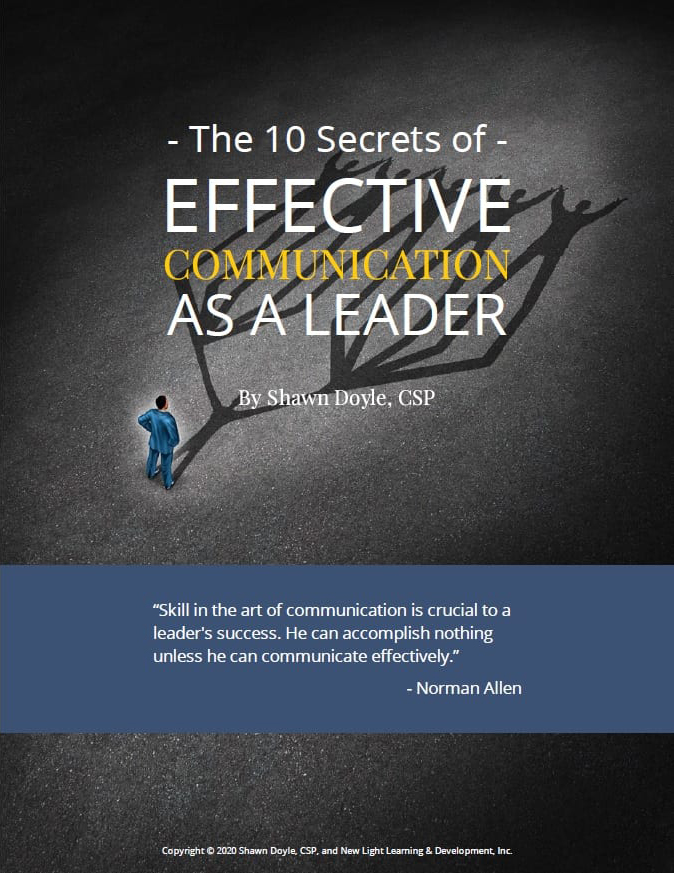Blog

Setting Leadership Goals and Objectives
Setting Leadership Goals And Objectives
As I wrote this, I was on a plane flying from Austin, Texas to Denver, Colorado. Do you think that the pilot would have taken off from the airport aimlessly, without any kind of flight plan? If you go on a cruise, does the captain drift without direction and hope that the ship makes it to the intended destination? Both of those questions seem ridiculous, don’t they? You’d never trust a pilot or a captain who would wander pointlessly – how can you get somewhere without a set course? Despite how obviously useless having no direction may seem, it’s something that I see all of the time.
Before you read further take a quick assessment by answering the following questions “yes” or “no”.
- Have you set personal leadership goals and objectives?
- Are these leadership goals in writing?
- Do you have short term, mid term and long terms leadership goals?
- Does your company have company goals for this year?
- Are these company goals in writing?
- Does every employee of your company know what these goals are?
- Does your company have long term goals and objectives?
Well, how did you do? Ok, now back to our regularly scheduled article. 🙂
I’ve spoken at several corporations across the country, doing keynotes and training sessions. When I conduct an exercise about short, mid, and long term goals, I’m astounded. Why? I’m astounded because 98% of the participants don’t have goals of any kind. How do I know? I ask them. They simply don’t have them, and offer several interesting reasons as to why:
“I don’t have the time – I’m just too busy.”
“I haven’t really thought about it.”
“It doesn’t seem that important.”
Do we have a new generation that doesn’t have goals? No, the people in the sessions are a wide range of ages from 20 – 60. I am very concerned that people are operating their personal and professional lives without a real purpose and a plan (written or other wise). This is not conjecture – this is what they are telling me.
Why Some People Have No Leadership Goals And Objectives
So why do people operate this way without direction of personal or professional goals? The question is a compelling one that I can’t answer.
So then I wonder, does this also happen with companies? Surely the CEOs, CFOs, and executives in companies set leadership goals and objectives, right? Well, a few months ago, I was facilitating an executive retreat. “Do you have strategic leadership goals and objectives for this year?” I asked them. After a few seconds of awkward silence, the CEO spoke up quietly:
”Well, sort of.” I said “either you do or you don’t.” Silence.
“Do you have strategic leadership goals and objectives for this year?” I continued. More silence.
“Um, we should probably work on that,” muttered the CFO, raising an eyebrow.
“Do you have a long term plan for the next 3 to 5 years?” They all shifted uncomfortably in their seats. I already knew what the answer was going to be.
“No.”
Why Many Companies Have No Leadership Goals And Objectives
While many Fortune 500 companies have comprehensive and well articulated plans, I’m finding many mid to small sized companies have no plans whatsoever. (Don’t argue the point. I see it all over the country.)
Why is that? There are several possible reasons:
- Their bias against goal setting in their personal life can transfer to their company. Because they don’t have goals in their personal life, they don’t have them in the company either. A company that is successful despite itself.
- They’re so caught in the day-to-day operations that they only serve urgent issues at the expense of the company’s future. This leads to a form of myopic thinking where they are concentrating only on today, next week and this month. They are caught up on the “ what’s on fire syndrome”, ruled by urgency.
- They founded a business because they were good at something, but never gained the skill of strategic planning. They don’t have a critical skill to build the companies long term future.
How can leaders without an actual plan lead companies with hundreds of employees who have faith in their leadership? It’s very disconcerting.
4 Examples of What You Can Do Starting Today
If you are a leader, what can you do? Here are a few suggestions:
- Model goal setting in your personal life.
I believe that leaders have to mirror the behavior they want to see in their employees. Show employees you are doing comprehensive goal setting in your personal life and encourage them to do the same. - Encourage employees to set personal goals, and provide training if needed.
If you take the time to do training on this topic, you will illustrate how important it is. - Take time to bring your team together to set company goals yearly.
Make sure that you meet with your executive team and set smart leadership goals and objectives for the following year that are measurable and specific. Set goals for revenue, cash flow, profit margins etc. If you can’t do it on your own bring in outside help. Yes it can be costly but you can’t afford not to. - Communicate the leadership goals and objectives to all employees on a consistent and regular basis.
If it’s not communicated, it doesn’t exist. Make sure to communicate it frequently and give regular updates on the goals and where you stand as a company. It will drive employees to help make the goals.
Keep in mind that people cannot hit a target that they’ve never identified. In the words of Socrates, “The unexamined life is not worth living.”
[Tweet ““The unexamined life is not worth living.” – Socrates”]Want to know more? Read my article, How To Achieve Your Goals.







